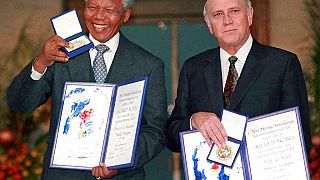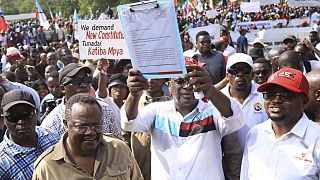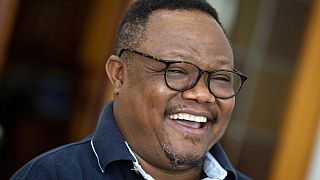Tanzania
The Nobel Prizes in Science and Literature were awarded in the countries of the laureates for the second consecutive year, without the usual pomp and circumstance.
In London, Abdulrazak Gurnah received his medal and diploma at noon from the Swedish ambassador, Mikaela Kumlin Granit, at his official residence, a few days before a ceremony at Stockholm City Hall in Sweden on December 10, the anniversary of Alfred Nobel's death.
"Ordinarily, you would have received the prize from His Majesty the King of Sweden. However, this year the pandemic forces us to celebrate from a distance. And since you cannot travel to Stockholm, your Nobel Prize medal and diploma have been brought to you here today," she said.
- "Empathic narrative" -
The ambassador recalled that the jury had praised his "empathetic and uncompromising account of the effects of colonialism and the fate of refugees caught between cultures and continents."
The novelist appeared relaxed and smiling, posing for photographers in a suit and tie with his medal and diploma. Family members and his longtime editor, Alexandra Pringle, attended the event.
Abdulrazak Gurnah, 72, is the first author of African descent to win the Nobel Prize in Literature since South Africa's J.M. Coetzee in 2003. He was honored for his stories about the colonial and post-colonial era in East Africa and the torments of refugees caught between two worlds.
The jury that chose to award him the prize, endowed with ten million Swedish kronor (almost 1 million euros), praised his "commitment to truth and his aversion to simplification.
Born in 1948 in Zanzibar - an archipelago off the coast of East Africa that is now part of Tanzania - Abdulrazak Gurnah fled to England in the late 1960s, a few years after the independence of this former British protectorate, at a time when the Arab community was persecuted.
He began writing at the age of 21 in the United Kingdom, the country of which he became a citizen, inspired by his memories and experiences as an immigrant.
"I want to write about human interaction, what people go through when they rebuild their lives," he said at a press conference the day after his award in early October.
- I say what I think" -
As a young man, he had "fallen" into writing without having planned it. And he did not see the supreme reward coming: "You write the best you can, and you hope it works!"
A sometimes unsung author before the Nobel, the writer has published ten novels, three of which have been translated into French ("Paradis", "Près de la Mer" and "Adieu Zanzibar"), as well as several short stories. He writes in English, although his native language is primarily Swahili.
He now lives in Brighton, in the southeast of England, and taught literature at the University of Kent until his retirement.
Nobel Prize or not, the novelist assured that he would continue to speak frankly about the issues that have shaped his work and his worldview. "This is my way of speaking," he said, "I don't play a role, I say what I think.
He castigates the hard line of European governments on immigration from Africa and the Middle East as cruel and illogical.
His latest book, "Afterlives", follows a little boy stolen from his parents by German colonial troops and who returns to his village to find his missing parents and sister.
2021 was a banner year for African literature, with three major prizes - the Nobel, Booker Prize and Goncourt - won by African writers.











Go to video
A British woman gives birth after UK’s first womb transplant
00:51
UK is finalising Chagos deal with Mauritius
Go to video
Pics of the day: March 21, 2025
02:47
British national killed in Kenya by President's motorcade vehicle
Go to video
Pics of the day: March 12, 2025
Go to video
Pics of the day: March 03, 2025